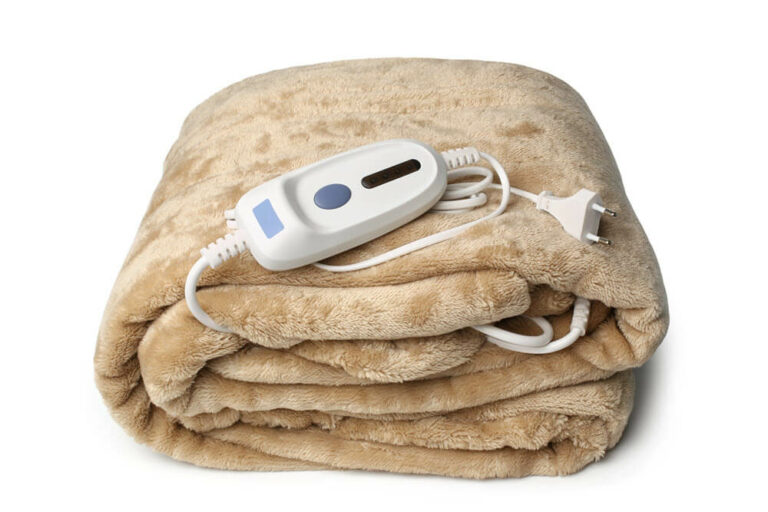So, you’re thinking of purchasing a weighted blanket? Good for you! People purchase this magical sleep aid for different reasons. Perhaps you’re turning and tossing at night? Or maybe you are under work-related stress? Whatever is causing you to lose sleep, there are various solutions to help you unwind at the end of the day, and one of these is a weighted blanket.
Weighted blankets have gotten a lot of great publicity for being a tool for deep touch therapy. Deep pressure stimulation and the blankets that cause such a sensation are claimed to improve sleep by calming your nervous system and relieving stress. Imagine your new weighted blanket as a gentle, soft hug that sometimes all of us need. However, not all of us like the same amount of pressure.
So, the most important factor when purchasing a weighted blanket is choosing the right weight of the blanket. That’s precisely the decision we’ll help you with in our article, so buckle up!.
What Is a Weighted Blanket?
Simply put, a weighted blanket is a heavy blanket filled with heavy materials such as plastic pellets. These blankets are also known as anxiety blankets or gravity blankets and are created to be heavier than regular blankets. In fact, they can weigh anywhere from 5 to 30 pounds (2.5 to 13.5 kilograms). Weighted blankets are usually built from 6×6-inch (15×15 centimeters) stitched squares, and each square is filled with poly pellets, glass beads, sand, or plastic pellets to provide the blanket with the required weight.
As we mentioned, your weighted blanket has the effects of deep pressure stimulation (DPS) and promotes relaxation, providing a sense of calmness.
Weighted blankets also have numerous other benefits and are created to provide some relief if you suffer from the following medical conditions: depression, PTSD, autism spectrum disorders, sensory processing disorder, restless leg syndrome, insomnia, sleep disorders, and ADHD.
Weighted blankets come in various sizes and weights and can be used by both kids and adults, which yet again brings us to our main point; as children and adults can’t use the same weight, how do you choose the right weighted blanket?.
How to Choose the Right Weighted Blanket?
Here are the details.
The Perfect Weighted Blankets Weight for Adults
Determining the weight of your weighted blanket should be rather easy. The general guideline for weighted blankets for adults is 10% of the weight of your body. Typically, a weighted blanket should be around 10 to 20 pounds (4.5 to 9 kilograms) when it comes to adults.
This ensures that your weighted blanket creates a hugging sensation, which in turn causes a sense of calmness, reduces stress, and helps you fall and stay asleep more easily. The perfect weight of your weighted blanket will enable your body to achieve deep sleep, so you’ll wake up well-rested and in a good mood.
| Weighted Blanket Weight Guide for AdultsGeneral guidelines: 10% of your body weight | |||
| Body Weight in Pounds | Weighted Blanket Weight in Pounds | Body Weight in Kilograms | Weighted Blanket Weight in Kilograms |
| 120 | 12 | 55 | 5,5 |
| 130 | 13 | 59 | 5,9 |
| 140 | 14 | 63,5 | 6,35 |
| 150 | 15 | 68 | 6,8 |
| 160 | 16 | 72,5 | 7,25 |
| 170 | 17 | 77 | 7,7 |
| 180 | 18 | 82 | 8,2 |
| 190 | 19 | 86 | 8,6 |
| 200 | 20 | 90 | 9 |
Keep in mind that there are always exceptions to every rule. If you feel discomfort while you use your weighted blanket, look for something a little bit lighter or heavier (as the case may be).
The Perfect Weighted Blanket Weight for Children
The general recommendation for weighted blankets for kids is 10% of their body weight and an additional one or two pounds (0.5 or 1 kilogram). It’s quite essential to select the right weight for kids so that they stay safe and experience more benefits from their weighted blanket.
| Weighted Blanket Weight Guide for ChildrenGeneral guidelines: 10% of their body weight plus one or two pounds (0,5 or 1 kilogram) | |||
| Body Weight in Pounds | Weighted Blanket Weight in Pounds | Body Weight in Kilograms | Weighted Blanket Weight in Kilograms |
| 20 | 3-4 | 9 | 1.3-1.8 |
| 30 | 4-5 | 13.6 | 1.8-2.26 |
| 40 | 5-6 | 22.22 | 2.26-2.7 |
| 50 | 6-7 | 22.6 | 2.26-3.18 |
| 60 | 7-8 | 27.2 | 3.18-3.6 |
| 70 | 8-9 | 31.75 | 3.6-4 |
| 80 | 9-10 | 36.3 | 4-4.5 |
| 90 | 10-11 | 41 | 4.5-5 |
| 100 | 11-12 | 45 | 5-5.4 |
Basically, a weighted blanket that is 10 to 25 pounds (4.5 to 11 kilograms) is too heavy for younger children, and weighted blankets shouldn’t be used for babies. If your child is under five years seek for medical advice before using a weighted blanket.
The Perfect Weighted Blanket Weight for Elderly People
For elderly people, you should use the same guidelines that you use for children: 10% of their body weight and an extra one or two pounds (0.5 or 1 kilogram). As you get older, your age will start causing sleep problems. If you’re an older adult that suffers from respiratory conditions or other medical conditions, such as sleep apnea, a 10 to 25-pound blanket can be too heavy and dangerous. Always consult a medical professional before using a weighted blanket.
What if I Fall Between Two Weight Classes?
When purchasing a weighted blanket, 10% of your body weight is a great rule of thumb, but choosing the weight can also be up to your personal preferences. For instance, in case you fall between standard weights, and you’re unsure whether to size down or up, the best way would be to try it.
If you’re of smaller stature, additional weight can be troublesome and suffocating, despite your actual weight. On the other hand, if you’re athletic and strong, you wouldn’t get the full benefits of a weighted blanket if it’s on the lighter end, regardless of your body weight. That being said, there’s one more factor.
What about your height? Weighted blankets come in various dimensions as well. To select your ideal dimensions, consider the size of your bed and your height. Your height isn’t as important as your body weight, but you do want to feel comfortable and be fully covered. This one is simple: purchase a weighted blanket that’s roughly the same size as you or slightly larger.
How to Know if Your Weighted Blanket Is of Perfect Weight?
No Signs of Discomfort
Probably the most important thing that determines how heavy your weighted blanket should be is that it should provide you with better sleep and a sense of calmness. Sleeping with a weighted blanket shouldn’t be an uncomfortable experience.
Here are some signs of discomfort that you may notice when you use a weighted blanket: restless sleep or sleeping problems, feeling claustrophobic or trapped, respiratory or breathing problems like sleep apnea, restricted motion, etc.
In case you’re experiencing these discomforts while using your weighted blanket, try using a lighter one, and subtract one or two pounds (0.5 or 1 kilogram) until you feel more comfortable.
Quality of Sleep Improves and Symptoms of Health Conditions Alleviate
Weighted blankets are essentially deep touch therapy blankets and are designed to improve the overall sleep quality and help you with some health conditions and sleep problems. After utilizing your weighted blanket for a while, you should experience sleep improvements, including alleviating symptoms of anxiety, restless sleeping, or insomnia.
In case you don’t notice any of these improvements, then your weighted blanket isn’t doing its job as it should be and acts exactly like your regular blanket. This could be due to its lack or excess of weight. Try using a heavier one and add one or two more pounds as long as you’re feeling comfortable.
Can Your Gravity Blanket Be Too Heavy?
It absolutely can! As we surmised, if you decide to try a weighted blanket, the most important thing is that you don’t experience any discomfort, and the weight of your weighted blanket has to be distributed equally to achieve maximum effect.
We also previously mentioned that weighted blankets use deep touch pressure, and it’s activated only when you feel enough pressure all over your body. In turn, that promotes the secretion of serotonin, also known as the happy hormone.
Serotonin is a predecessor to melatonin, the sleep hormone. Both melatonin and serotonin can reduce stress and anxiety, which results in better sleep. Therefore, you have to be sure that you’re receiving enough deep touch pressure to increase the levels of serotonin and melatonin. But, too much weight can definitely have the opposite effect.
A Few Words Before You Go…
Purchasing your own weighted blanket is usually a worthwhile investment in better sleep quality that outlives the price you’ll pay for it. However, buying the right weight for yourself or your loved ones is necessary in order to experience the full benefits of your weighted blanket. Therefore, knowing your body weight is essential if you’re to make the right decision. As a reminder, the general rule is that your weighted blanket should weigh 10% of your body weight. Sleep well!






